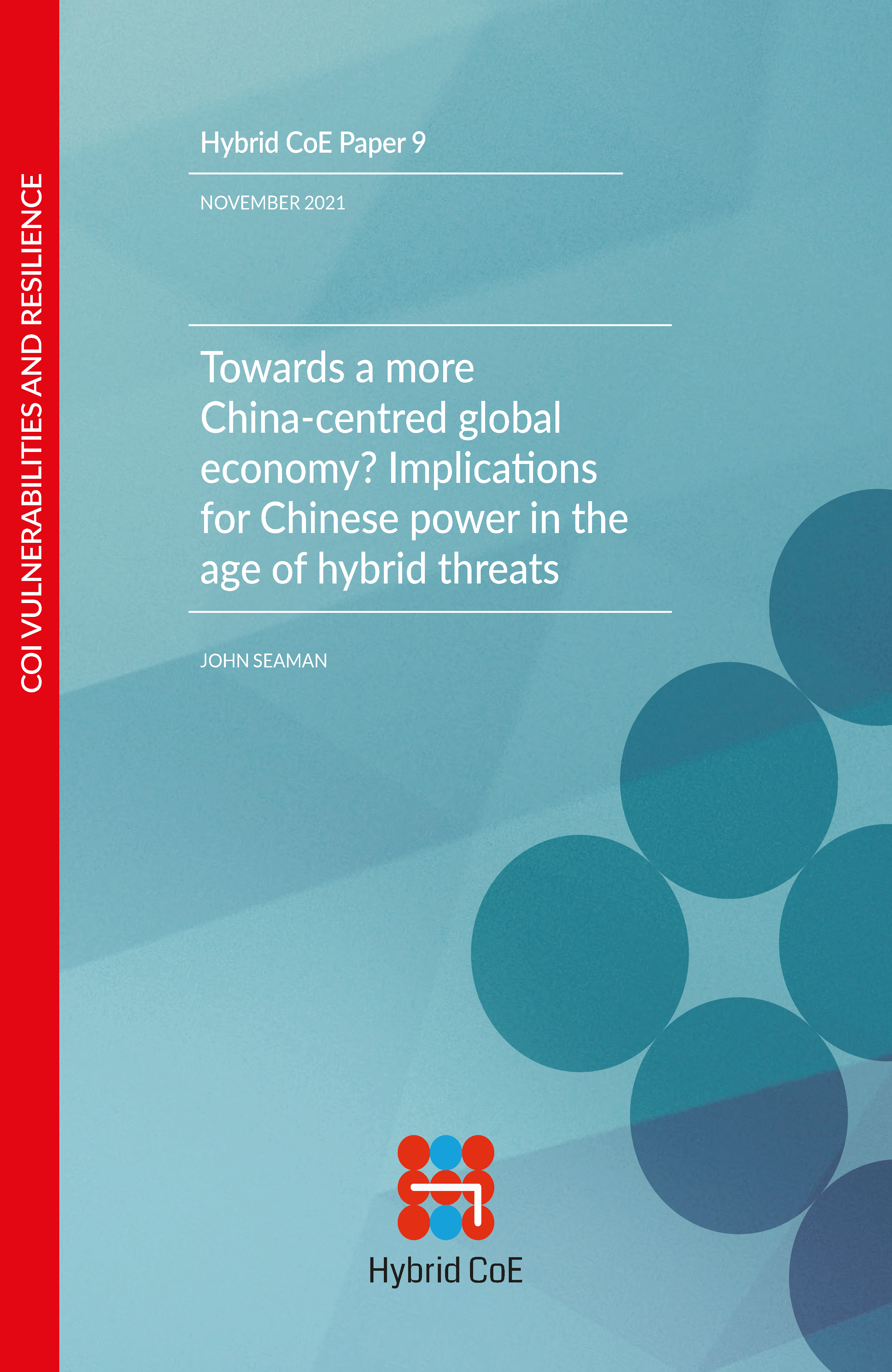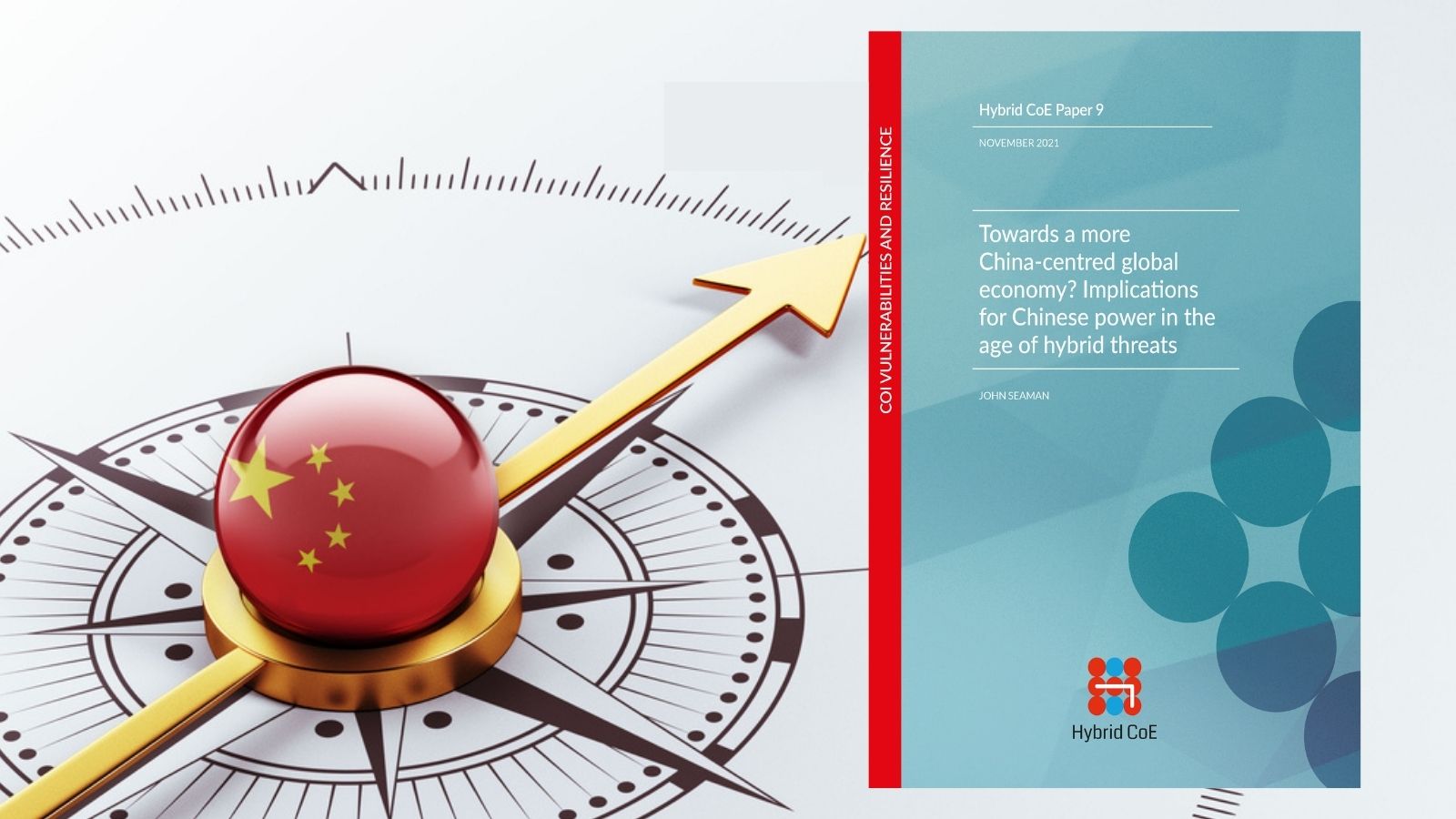Towards a more China-centred global economy? Implications for Chinese power in the age of hybrid threats

An era of hyper globalization is giving way to an age of geoeconomics wherein China seeks a decisive seat at the table.

As China continues to rise, a key question will be whether and to what extent it is able to translate economic prowess into comprehensive national power and global influence. When considering the question of hybrid threats to democratic political systems, China’s role in transforming the global economy raises two broad questions. The first relates to the scope of China’s economic power. To what extent can and will China’s rise transform the global economy in a way that amplifies its power in the age of hybrid threats and undermines liberal democratic institutions and their underlying value systems? The second relates to China’s ambitions with regard to political and social change. To what extent does China seek to undermine liberal democratic institutions and actively export or construct an alternative model?
This paper analyses the rise of a new geoeconomic world order and discusses how economic power is organized and wielded within a context of complex interdependence. It considers how the notion of interdependence has changed from a stabilizing force in international relations into a source of asymmetric power and, conversely, of vulnerability. It describes how a networked global economy produces asymmetric interdependencies that amplify economic power in the hands of states that are able to achieve a degree of network centrality. The paper explores five interrelated actions that China is taking that ultimately increase its network centrality in the global economy today:
- Cultivating resilience through indigenization
- Pursuing high-end import substitution and export promotion (“dual circulation”)
- Establishing hard and soft infrastructure hubs
- Building a narrative and a community framework
- Elaborating upon the relevant tools of economic statecraft
Ultimately, the hybrid threats resulting from China’s increasing economic power can be considered in two different ways: 1) direct, or active threats to liberal democracies stemming from the ability to impress upon or influence key economic infrastructure and actors, and 2) systemic-level threats related to the rules, values and principles on which these systems are built.
This article was published by the European Centre of Excellence for Countering Hybrid Threats.
Access the text from the Hybrid CoE website:
Towards a more China-centred global economy? Implications for Chinese power in the age of hybrid threats

Available in:
Regions and themes
ISBN / ISSN
Share
Related centers and programs
Discover our other research centers and programsFind out more
Discover all our analysesJapan’s Takaichi Landslide: A New Face of Power
Prime Minister Sanae Takaichi has turned her exceptional popularity into a historic political victory. The snap elections of February 8 delivered an overwhelming majority for the Liberal Democratic Party (LDP), driven by strong support from young voters, drawn to her iconoclastic and dynamic image, and from conservative voters reassured by her vision of national assertiveness. This popularity lays the foundation for an ambitious strategy on both the domestic and international fronts.
The U.S. Policy Toward Taiwan Beyond Donald Trump: Mapping the American Stakeholders of U.S.-Taiwan Relations
Donald Trump’s return to the White House reintroduced acute uncertainty into the security commitment of the United States (U.S.) to Taiwan. Unlike President Joe Biden, who repeatedly stated the determination to defend Taiwan, President Trump refrains from commenting on the hypothetical U.S. response in the context of a cross-Strait crisis.

China’s Strategy Toward Pacific Island countries: Countering Taiwan and Western Influence
Over the past decade, China has deployed a diplomatic strategy toward the Pacific Island Countries (PICs). This strategy pursues two main objectives: countering Taiwan's diplomatic influence in the region and countering the influence of liberal democracies in what Beijing refers to as the "Global South."

Opening up the G7 to South Korea to Address Contemporary Global Challenges
The G7’s global influence has diminished as powers like China reshape international governance through initiatives such as BRICS and the Shanghai Cooperation Organisation (SCO). With the G7 now representing just 10 per cent of the world’s population and 28 per cent of global GDP, its relevance is increasingly questioned.










